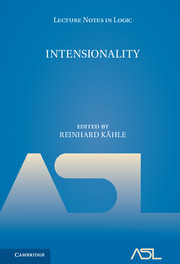Book contents
- Frontmatter
- Preface
- Contents
- The modal aether
- Possible worlds semantics for predicates
- A context principle
- The semantics of modal predicate logic II. Modal individuals revisited
- Intensionality and coercion
- Intensionality in philosophy andmetamathematics
- Representation theorem for models of dynamic intensional logic
- Intension, intention
- Modality, mood, and descriptions
- Coercion vs. indeterminacy in opaque verbs
- References
The semantics of modal predicate logic II. Modal individuals revisited
Published online by Cambridge University Press: 30 March 2017
- Frontmatter
- Preface
- Contents
- The modal aether
- Possible worlds semantics for predicates
- A context principle
- The semantics of modal predicate logic II. Modal individuals revisited
- Intensionality and coercion
- Intensionality in philosophy andmetamathematics
- Representation theorem for models of dynamic intensional logic
- Intension, intention
- Modality, mood, and descriptions
- Coercion vs. indeterminacy in opaque verbs
- References
Summary
Abstract. We continue the investigations begun in [10]. We shall define a semantics that is built on a new kind of frames, called coherence frames. In these frames, objects are transcendental (world-independent), as in the standard constant-domain semantics. This will remove the asymmetry between constants and variables of the counterpart semantics of [10]. We demonstrate the completeness of (general) coherence frames with respect to first- and certain weak second-order logics and we shall compare this notion of a frame to counterpart frames as introduced in [10] and the metaframe semantics of [13].
Introduction. In [10] we have developed a semantics that is complete with respect to first- and weak second-order modal predicate logics. This semantics was in addition quite elementary, which was already a great step forward from the previous semantics by Ghilardi [6] and by Skvortsov and Shehtman [13]. Still, from a philosophical point of view this semantics left much to be desired. The introduction of counterpart relations—although in line with at least some philosophical ideas, notably by Lewis — is not always very satisfactory since it makes the notion of an object a derived one. The things we see become strictly world bound: there is no sense in which we can talk of, say, the town hall of Berlin, rather than the town hall of Berlin in a particular world, at a particular point of time. The traditional semantics for modal predicate logic held the complete opposite view. There, objects are transcendental entities. They are not world bound, since they do not belong to the worlds. The difference between these views becomes clear when we look at the way in which the formula is evaluated. In the standard semantics, we simply go to some accessible world and see whether holds. In counterpart semantics, we not only have to choose another world but also some counterparts for the things thatwe have chosen as values for the variables in this world. In the traditional semantics the question of counterparts does not arise because of the transcendental status of objects. We may view this as a limiting case of counterpart semantics, in which the counterpart relation always is the identity.
Information
- Type
- Chapter
- Information
- Intensionality , pp. 60 - 96Publisher: Cambridge University PressPrint publication year: 2005
